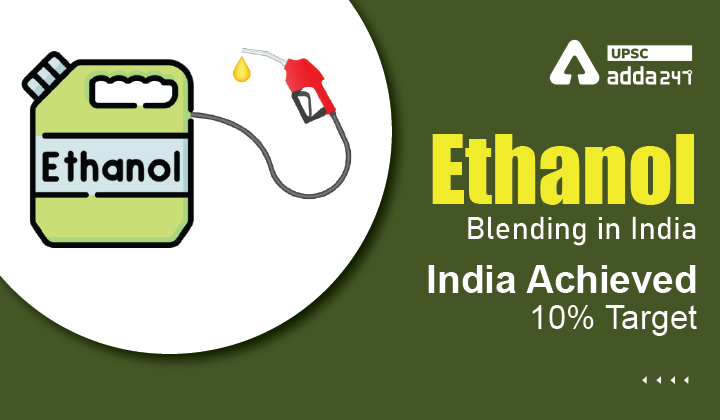Table of Contents
Ethanol blending UPSC: Relevance
- GS 3: Infrastructure: Energy, Ports, Roads, Airports, Railways etc.
10% Ethanol blending: Context
- Recently, Ministry of Petroleum & Natural Gas has informed that the target of 10% blending under Ethanol Blended Petrol (EBP) programme has been achieved much ahead of the targeted timelines of November, 2022.
भारत में इथेनॉल सम्मिश्रण: भारत ने निर्धारित समय से पूर्व 10% का लक्ष्य प्राप्त किया
Ethanol blending target: Key points
- Due to the coordinated efforts of the Public Sector Oil Marketing Companies (OMCs), the country has attained an average 10% ethanol blending in petrol across the country.
- This achievement in the course of last 8 years has not only augmented India’s energy security but also translated into a forex impact of over Rs.41,500 crores, reduced GHG emissions of 27 lakh MT and also led to the expeditious payment of over Rs.40,600 crores to farmers.
Ethanol blending meaning: How it evolved?
- The ethanol-blended petrol (EBP) programme was first launched in 2003. It proposed blending of 5% ethanol in petrol in 9 states and 4 UTs.
- The efforts got reinvigorated after 2014 when the government decided to re-introduce administered price mechanism for ethanol to be procured under EBP programme.
- In 2018, National Policy on Biofuels was notified to achieve a 20% blending of biofuels with petrol by 2030.
- In 2020, National Biofuel Coordination Committee approved the utilisation of maize, sugar beet, sorghum etc, apart from sugarcane for making ethanol.
- In 2021, the objective of 20% blending gets advanced from 2030 to 2025.
Ethanol blending in petrol: Roadmap for ethanol blending
- Last year, our prime minister released the report on the roadmap for ethanol blending in India 2020-25. The roadmap was prepared by the expert committee instituted by the Ministry of Petroleum and Natural Gas, under the chairmanship of Dr Rakesh Sarwal, NITI Aayog.
- The roadmap has pushed forward the year to achieve a 20% ethanol blended petrol or the E20 fuel supply from 2030 to 2025. The objective to achieve E10, however, remain the same—2022.
Ethanol blending in India: Benefits of ethanol-based fuel
The Ethanol-based fuel source has multipronged benefits.
- Ecological impact: This fuel has the potential to reduce the harmful greenhouse gases from the atmosphere. Gases like Carbon Monoxide, Oxides of Nitrogen and hydrocarbons have a significant contribution to air pollution. Ethanol blending can help in decreasing these emissions.
- Impact on consumer: E20 could decrease the fuel efficiency of our vehicles both, the 2-wheelers and the 4-wheelers. It is because the vehicles are not designed for E20 fuel. However, with engine modification, this drop in fuel efficiency could be neutralised.
- Economic impact: The use of ethanol can decrease our current account deficit. E20 program can reduce our import bills by Rs.30,000 per annum. It has the potential to have a multiplier effect on our economy.
- Effective waste management: Bioethanol can be produced from fruit and vegetable waste, crop residues, wood pulp, animal waste or garbage in general. It can help in managing the waste generated around us daily, apart from being a non-competing source to produce ethanol.
- Increasing farmer income: Ethanol production can diversify the source of income for the farmers. It will prove to be a boon for the farmers as they could get a better price for their produce.
- Strategic importance: India is one of the largest importers of crude oil. Becoming self-sufficient in fuel would make us less dependent on the other nations and, this could increase our bargaining power while establishing geopolitical relations with the world.
Read current affairs for UPSC





 TSPSC Group 1 Question Paper 2024, Downl...
TSPSC Group 1 Question Paper 2024, Downl...
 TSPSC Group 1 Answer key 2024 Out, Downl...
TSPSC Group 1 Answer key 2024 Out, Downl...
 UPSC Prelims 2024 Question Paper, Downlo...
UPSC Prelims 2024 Question Paper, Downlo...





